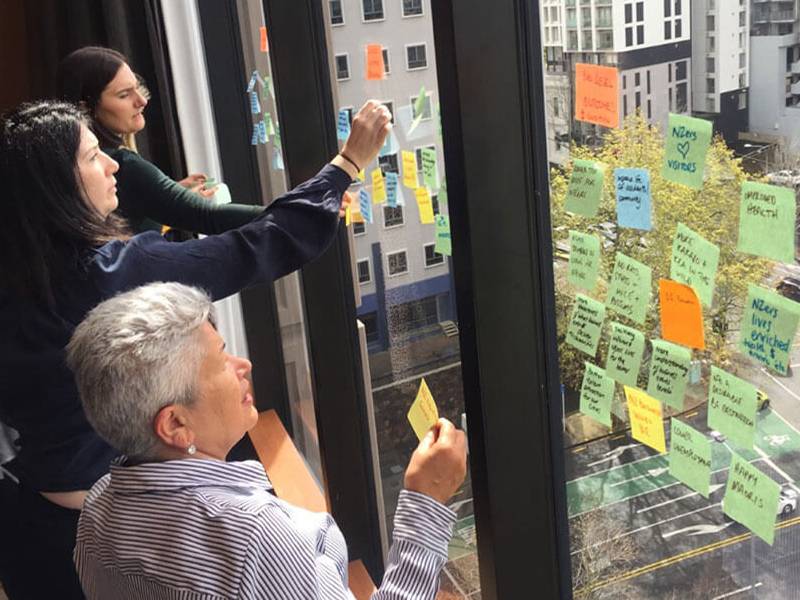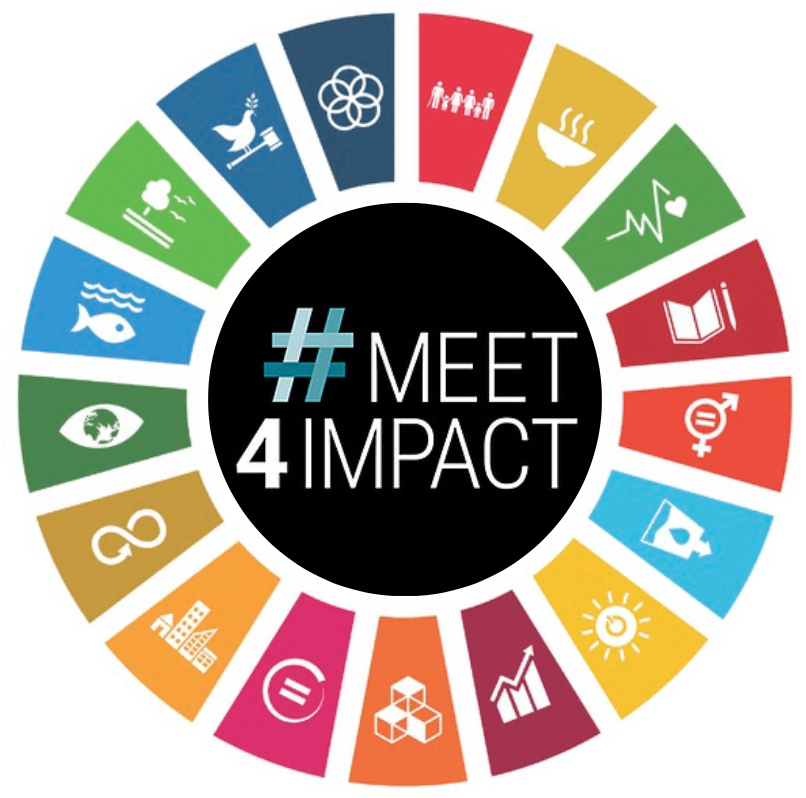#MEET4IMPACT: “Sense of relevance is perhaps the most pressing issue today”

Workshop conducted by #Meet4Impact with Tourism New Zealand, on a project entitled "Enrich New Zealand - Conference Impact", in September 2019.
Disruptions are a hotbed for creativity and also a major driver for people to refocus their priorities, principles and ethos. The pandemic has also raised the issue of values, and even organisations are realising that they need to have a better corporate culture, carry strong values, and give a new meaning to their events. At BestCities, we met Geneviève Leclerc, president and CEO of MEET4IMPACT, a collective and collaborative project focused on making the events industry a driver of positive societal impact and lasting legacies. Check our conversation below:
1) How would you describe the role Meet4Impact plays in the business events industry?
I think the core role we play revolves around two aspects. First, building capacity: there seems to be an increased awareness that DMOs need to gain a better understanding of the impact their events are having on their community. We see more willingness to undertake efforts to remedy this situation and to put in place such strategies. We do that by training and consulting. The second gap concerns a lack of tools, methodologies and mentoring practices. This is the second role we play: developing tools, processes and methodologies for DMOs to carry out their social impact and legacy strategies around events.
 2) Do you think this is where destinations in the future will excel in bidding for association meetings and events?
2) Do you think this is where destinations in the future will excel in bidding for association meetings and events?
We will have a period where this will become a competitive advantage, however another will follow where not having done so will become a disadvantage. Sustainable development will see a ramp-up phase where more and more destinations are going to address this issue, and implement legacy and impact planning proposals. While this is happening, those who do it best and fastest will gain that advantage. Then there will be a tipping point with a cost for other destinations for not having done so, and therefore the dialogue will revolve on the loss of competitiveness by the absence of these strategies. It will take some time for that to happen as, after the setback we are experiencing now, people will go back to survival mode and risk management, to open the borders with all these contingencies. That’s going to delay the strategic work in a lot of places. The other thing is that it is also a long-winded process, so people who are investing now will probably start reaping the benefits within a year or two.
3) What major differences do you denote between the pre-COVID phase and now in the understanding of this matter?
I would say that the sense of relevance is perhaps the most pressing issue, which has driven decision-makers to want to make sure that what they are presenting is highly relevant. This is true both on the organiser side and the destination side. Especially for associations, as their members will start asking from now on why they should travel to meetings. The value proposition in travelling to a meeting is going to be a real issue in the coming years. So, associations will be looking for new strategies to attract people by including mechanisms that can create wider additional value in their meetings.
Another point is that associations also have to demonstrate that they are fulfilling their mission. There is a small core of associations that are quite advanced in merging the objectives of their meetings with their underlying mission. But the reality is that there is a whole silent crowd behind them where that work is not necessarily being done. How to broadly align your meetings with your 360 strategy, and tie them together over the years. Anchoring your meeting in a stronger impact narrative is a tool for associations to strengthen their mission.
"Sustainable development will see a ramp-up phase where more and more destinations are going to address this issue, and implement legacy and impact planning proposals."
4) With the associations you have worked with, have you at any point struggled to guide your partner in the search for a core legacy of a particular event?
Many associations have built into their mission how to serve members every day. Almost all their resources and time presuppose responsibility towards them. In fact, not all associations pay attention to how they help the world in a wider sense and fewer think about the possible link between these two axes - how to improve the world around them while helping their members! If they get that kind of clarity, it will be much easier to engage them in a legacy or impact initiative. Thinking about how to positively shape society and leave an important legacy behind is the natural first step. Somehow, in Madrid, we felt that the technical membership associations were possibly more out of touch in this dialogue. Certain associations − because they are so focused on serving their members − may lack clarity about actions that could impact their environment. If they cannot articulate that impact through their activity, they will find it harder to implement a legacy at their meetings. They need to go back and realise “what is our true value proposition”, to see how an event can influence that.
5) Do the concepts of legacy and social impact belong to the same framework and methodology? Are they necessarily complementary?
They are two sides of the same coin. The legacy is what the organisation is going to intentionally create and leave behind. This is what associations and destinations can do together, working on the development of tangible projects for people to relate their respective legacies to the conferences that preceded them. It is driven by the organisation as a desire to leave positive results and generate added value. Impact is the change this legacy will create. When the legacy creates positive local change and the community feels it, we call it impact. This is what you want to measure in the end: whether the legacy of the conference, two or three years after it took place, generated positive value and change. On the other hand, legacy does not necessarily leave an impact and impact is never generated solely by a legacy. It has to be monitored, measured and evaluated like any other change process. The final impact will always be a combination of factors, especially if you are talking about three years downstream. Considering that the legacy itself belongs to the conference and the efforts to create impact, that contribution may not be 100% relatable or accountable. That is why we talk about legacy planning and impact measurement.
6) Do you think that a possible hunger for business after the pandemic, could undo or slow down all the great steps we have been making these last two years?
Yes, I do. We, as associations, always tend to choose destinations that already have a strong base, a strong national society, that can generate more money and participants, and yet are not necessarily the ones that need us the most. We would probably have had a much better impact, if we had gone to a destination that was struggling to have any kind of representation and was willing to grow in the same field as the conference. Struggling to have social acceptability. These were the destinations we should have gone to and with the greatest potential impact for our conference. Now, are we competing with business interests? Absolutely, we are. Coming out of the pandemic, associations will need more than ever to generate direct revenue from their meetings. I do fear it will take a back seat and I think only very strategic organisations will be able to keep it at the forefront. However, financial sustainability is also a precondition for having impact. Therefore, business and impact objectives have to go hand in hand because if you don't meet one, you won't get the other. If you are not surviving and thriving as an organisation, then your impact will indeed be limited.






